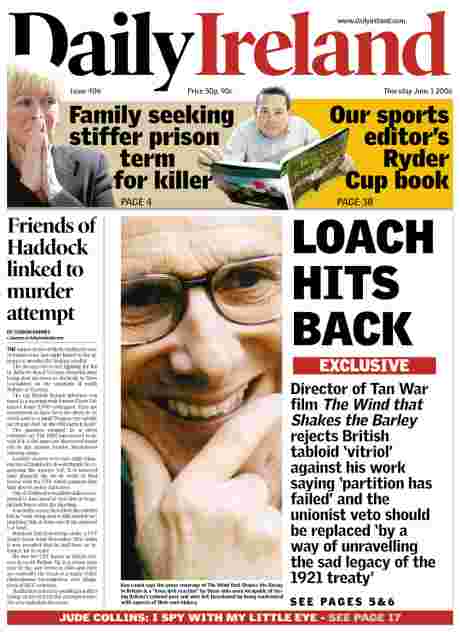 North Korea Increases Aid to Russia, Mos... Tue Nov 19, 2024 12:29 | Marko Marjanovi?
North Korea Increases Aid to Russia, Mos... Tue Nov 19, 2024 12:29 | Marko Marjanovi?
 Trump Assembles a War Cabinet Sat Nov 16, 2024 10:29 | Marko Marjanovi?
Trump Assembles a War Cabinet Sat Nov 16, 2024 10:29 | Marko Marjanovi?
 Slavgrinder Ramps Up Into Overdrive Tue Nov 12, 2024 10:29 | Marko Marjanovi?
Slavgrinder Ramps Up Into Overdrive Tue Nov 12, 2024 10:29 | Marko Marjanovi?
 ?Existential? Culling to Continue on Com... Mon Nov 11, 2024 10:28 | Marko Marjanovi?
?Existential? Culling to Continue on Com... Mon Nov 11, 2024 10:28 | Marko Marjanovi?
 US to Deploy Military Contractors to Ukr... Sun Nov 10, 2024 02:37 | Field Empty
US to Deploy Military Contractors to Ukr... Sun Nov 10, 2024 02:37 | Field Empty
Anti-Empire >>
Indymedia Ireland is a volunteer-run non-commercial open publishing website for local and international news, opinion & analysis, press releases and events. Its main objective is to enable the public to participate in reporting and analysis of the news and other important events and aspects of our daily lives and thereby give a voice to people.
 Trump hosts former head of Syrian Al-Qaeda Al-Jolani to the White House Tue Nov 11, 2025 22:01 | imc
Trump hosts former head of Syrian Al-Qaeda Al-Jolani to the White House Tue Nov 11, 2025 22:01 | imc
Was that not what the War on Terror was about ?
Today things finally came full circle. It was Al-Qaeda that supposedly caused 9/11 and lead to the War on Terror but really War of Terror by the USA and lead directly to the deaths of millions through numerous wars in the Middle East.
And yet today the former head of Syrian Al-Qaeda, Al-Jolani was hosted in the White House by Trump. A surreal moment indeed.
In reality of course 9/11 was orchestrated by inside forces that wanted to launch the War of Terror and Al-Qaeda has been a wholly backed American tool ever since then.
 Rip The Chicken Tree - 1800s - 2025 Tue Nov 04, 2025 03:40 | Mark
Rip The Chicken Tree - 1800s - 2025 Tue Nov 04, 2025 03:40 | Mark
That tree we got retained in 2007, is no more
2007
http://www.indymedia.ie/art...
2025
https://eplan.limerick.ie/i...
 Study of 1.7 Million Children: Heart Damage Only Found in Covid-Vaxxed Kids Sat Nov 01, 2025 00:44 | imc
Study of 1.7 Million Children: Heart Damage Only Found in Covid-Vaxxed Kids Sat Nov 01, 2025 00:44 | imc
A major study involving 1.7 million children has found that heart damage only appeared in children who had received Covid mRNA vaccines.
Not a single unvaccinated child in the group suffered from heart-related problems.
In addition, the researchers note zero children from the entire group, vaccinated or unvaccinated, died from COVID-19.
Furthermore, the study found that Covid shots offered the children very little protection from the virus, with many becoming infected after just 14 to 15 weeks of receiving an injection.
 The Golden Haro Fri Oct 31, 2025 12:39 | Paul Ryan
The Golden Haro Fri Oct 31, 2025 12:39 | Paul Ryan
Disability Fine Lauder and Passive Income with Financial Gain as A Motive
Why not make money?
 Top Scientists Confirm Covid Shots Cause Heart Attacks in Children Sun Oct 05, 2025 21:31 | imc
Top Scientists Confirm Covid Shots Cause Heart Attacks in Children Sun Oct 05, 2025 21:31 | imc
A comprehensive study by leading pediatric scientists has confirmed that the devastating surge in heart failure among children is caused by Covid mRNA shots.
The peer-reviewed study, published in the prestigious journal Med, was conducted by scientists at the University of Hong Kong.
The team, led by Dr. Hing Wai Tsang, Department of Pediatrics and Adolescent Medicine, Li Ka Shing Faculty of Medicine, School of Clinical Medicine, the University of Hong Kong, uncovered evidence to confirm that Natural Killer (NK) cell activation by Covid mRNA injections causes the pathogenesis of acute myocarditis.
Myocarditis is an inflammation of the heart muscle that restricts the body?s ability to pump blood.
The Saker >>
 Chaos as the Australian Liberal Party Backflips to Pass Hate Speech Laws Fri Jan 23, 2026 13:36 | Rebekah Barnett and Andrew Lowenthal
Chaos as the Australian Liberal Party Backflips to Pass Hate Speech Laws Fri Jan 23, 2026 13:36 | Rebekah Barnett and Andrew Lowenthal
Chaos has gripped Australian politics as the centre-Right Liberal Party backflips and passes authoritarian hate speech laws that allow for the pre-crime banning of protest groups and can be retroactively applied.
The post Chaos as the Australian Liberal Party Backflips to Pass Hate Speech Laws appeared first on The Daily Sceptic.
 Canadian Woman Euthanised ?Against Her Will? After Husband was Fed-Up With Caring For Her Fri Jan 23, 2026 11:14 | Will Jones
Canadian Woman Euthanised ?Against Her Will? After Husband was Fed-Up With Caring For Her Fri Jan 23, 2026 11:14 | Will Jones
An elderly woman was?euthanised "against her will" within hours of her husband claiming she changed her mind after insisting she wanted to live.
The post Canadian Woman Euthanised “Against Her Will” After Husband was Fed-Up With Caring For Her appeared first on The Daily Sceptic.
 Ed Miliband is Surrendering Our Energy Security to China Fri Jan 23, 2026 09:00 | Paul Homewood
Ed Miliband is Surrendering Our Energy Security to China Fri Jan 23, 2026 09:00 | Paul Homewood
With 95% of solar panel components and 75% of lithium batteries coming from China, Ed Miliband's reckless Net Zero drive is surrendering Britain's energy security to the Communist state, says Paul Homewood.
The post Ed Miliband is Surrendering Our Energy Security to China appeared first on The Daily Sceptic.
 The Sceptic | Episode 65: David Frost on the Scourge of New Labour?s ?Stakeholder? Revolution ? and ... Fri Jan 23, 2026 07:00 | Richard Eldred
The Sceptic | Episode 65: David Frost on the Scourge of New Labour?s ?Stakeholder? Revolution ? and ... Fri Jan 23, 2026 07:00 | Richard Eldred
In Episode 65 of the Sceptic: David Frost on the never-ending scourge of New Labour?s ?stakeholder? revolution ? and why Britain must reclaim free-market thinking.
The post The Sceptic | Episode 65: David Frost on the Scourge of New Labour?s ?Stakeholder? Revolution ? and Why Britain Must Reclaim Free-Market Thinking appeared first on The Daily Sceptic.
 News Round-Up Fri Jan 23, 2026 01:45 | Will Jones
News Round-Up Fri Jan 23, 2026 01:45 | Will Jones
A summary of the most interesting stories in the past 24 hours that challenge the prevailing orthodoxy about the ?climate emergency?, public health ?crises? and the supposed moral defects of Western civilisation.
The post News Round-Up appeared first on The Daily Sceptic.
Lockdown Skeptics >>
Voltaire, international edition
 Will intergovernmental institutions withstand the end of the "American Empire"?,... Sat Apr 05, 2025 07:15 | en
Will intergovernmental institutions withstand the end of the "American Empire"?,... Sat Apr 05, 2025 07:15 | en
 Voltaire, International Newsletter N?127 Sat Apr 05, 2025 06:38 | en
Voltaire, International Newsletter N?127 Sat Apr 05, 2025 06:38 | en
 Disintegration of Western democracy begins in France Sat Apr 05, 2025 06:00 | en
Disintegration of Western democracy begins in France Sat Apr 05, 2025 06:00 | en
 Voltaire, International Newsletter N?126 Fri Mar 28, 2025 11:39 | en
Voltaire, International Newsletter N?126 Fri Mar 28, 2025 11:39 | en
 The International Conference on Combating Anti-Semitism by Amichai Chikli and Na... Fri Mar 28, 2025 11:31 | en
The International Conference on Combating Anti-Semitism by Amichai Chikli and Na... Fri Mar 28, 2025 11:31 | en
Voltaire Network >>
 national |
arts and media |
other press
national |
arts and media |
other press
 Thursday June 01, 2006 23:45
Thursday June 01, 2006 23:45 by Mick Hall - Daily Ireland June 1 2006
by Mick Hall - Daily Ireland June 1 2006



























 printable version
printable version

 Digg this
Digg this del.icio.us
del.icio.us Furl
Furl Reddit
Reddit Technorati
Technorati Facebook
Facebook Gab
Gab Twitter
Twitter
View Full Comment Text
save preference
Comments (23 of 23)